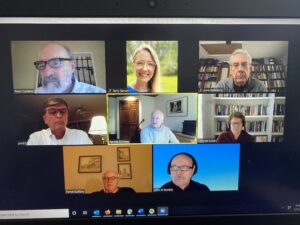Current Seminars
The Working Group on Economic Development (WGED)
WGED is a monthly seminar formed in 2005 by Jesse White, then head of the university’s Office of Economic and Business Development. It brings together academics, government officials, public policy practitioners, independent researchers, graduate students and other interested parties around issues relating to local/state/regional political economy, economic development, and related areas. At the monthly session, speakers from a variety of backgrounds and disciplines present their ideas on a timely, applied topic.
Click here for a list of session topics and presenters.
Click here to join the WGED invitation list.

Carolina Seminar, 2019-2022: The Perils and Promise of Capitalism in the 21st Century
Conveners: Peter Coclanis and Arne Kalleberg
The first decades of the new millennium have proven tough sledding for many capitalist economies, indeed, for capitalism qua system. Economic changes associated with globalization and technological change, coupled with, and exacerbated by social dislocations growing out of the Great Recession have sparked tensions and anxieties among millions in OECD nations, leading many to question the legitimacy of the capitalist regimes that made their societies rich in the first place.
Such tensions and anxieties are hardly surprising, given the profundity of change over the last two or three decades and the deep—and structural—problems that have plagued many nation-states in Europe and North America as well as Japan. Any short list of such changes would likely include wage stagnation, increasing income and wealth inequality, the relative rise of the “1%,” widespread rural distress, stubborn pockets of urban (and now suburban) poverty, an inability to deal successfully with immigration, political gridlock, and a growing sense of pessimism about the future, a future which many believe will be characterized by “secular stagnation” at best. All in a time of continued resource constraints and climate change.
These sources of unease have raised doubts among many about the efficacy going forward of capitalism, including democratic forms, not only the Anglo-American variant but also the “social” forms characteristic of Germany and Scandinavia. Some critics of democratic capitalism are looking toward one or another form of authoritarian capitalism—variants in China, Russia, Turkey, Poland, and Hungary come immediately to mind—while others are moving toward out -and -out authoritarianism and/or rejection of capitalism altogether. In this regard it is worth noting that a Gallup Poll taken in summer 2018 found that Democrats in the U.S. viewed socialism more favorably than capitalism.
Although today’s unease and stress about capitalism are understandable, it is also important to keep in mind that over time capitalism, for all its faults, has proven unparalleled as an engine of growth and development. Still, it is undeniable that that unless capitalist nation-states acknowledge, confront and deal successfully with the most serious problems associated with capitalism—inequities, disparities, and insufficient inclusiveness among them—capitalist nation-states will remain tense socially and fraught politically.
The Carolina Seminar will meet for three years to explore and analyze the future of capitalism. Drawing on expertise from different units and departments within UNC, we hope to provide a non-partisan, multidisciplinary forum and platform for open, evidence-based discussion and debate on issues pertinent to capitalism and capitalist nation-states, whether viewed at the global regional, national, state, or local level. The Seminar expects to culminate in a menu of policies appropriate for consideration and implementation at one or another level of governmental authority.

